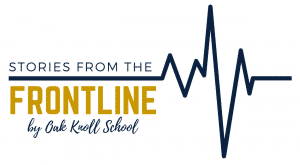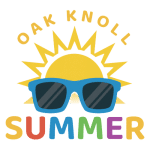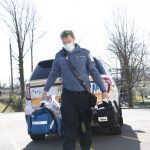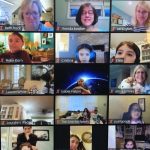Call of Duty: Doctor Battles COVID-19 Health Crisis Through Telemedicine
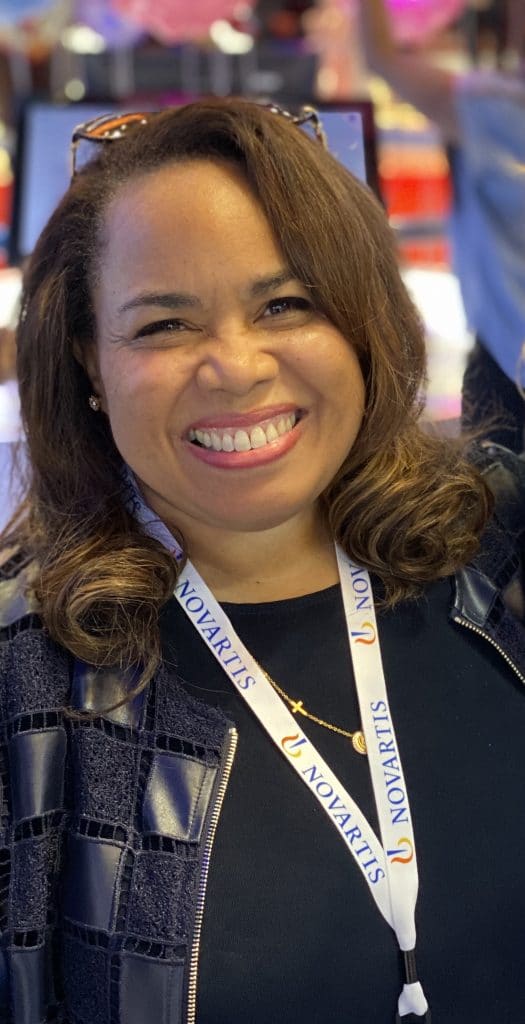 Doctor Neilda Baron, M.D. ’77 doesn’t regret the jump she made into pharmacological medicine 24 years ago when her two oldest children were three and four.
Doctor Neilda Baron, M.D. ’77 doesn’t regret the jump she made into pharmacological medicine 24 years ago when her two oldest children were three and four.
Long and inconsistent shifts as an Internal Medicine Resident / Hematology-Oncology Fellow filled her days, nights and weekends with work but left her with little or no time to spend with her young children.
So, Baron left clinical medicine behind and the personal satisfaction of having an intimate patient-doctor relationship that she loved. Instead, she established a career with more “stable” hours in pharmaceutical medicine.
Today, Baron is the Executive Director of U.S. Oncology Medical Affairs team for Novartis Pharmaceutical Corp. While she misses clinical medicine, the time that she was able to spend with her three daughters (youngest Aurora-Yasmine Ghorab ’19) has made the career-change absolutely worth it.
Trained in Hematology-Oncology, Baron and her nearly 30-person team of health care professionals work with physicians and other health care professionals across the country whose patients are taking a Novartis-approved product and/or participating in a clinical trial. Baron and her team field medical questions pertaining to their oncology products, support the development of scientific publications as well as approve advertising information which is found in scientific publications and heard via radio and television commercials.
“Nevertheless, COVID-19 has had a tremendous impact on our department,” said Baron.
Today, instead of crisscrossing across the country participating in countless face-to-face meetings, COVID-19 has forced Baron’s team to interact with doctors, nurses, pharmacists and some patients virtually rather than in-person.
Now, via Microsoft Teams, Skype or Google Chat, Baron’s team discuss scientific findings, adverse events (side effects), conduct training on drug administration, trouble-shoot access challenges as well as answering other questions, including the impact of COVID-19 on the patient’s current treatment.
“Unfortunately, many of the patients currently on our drugs are not only immunosuppressed but have co-morbidities,” said Baron, who works with patients taking the Novartis drug Piqray (a drug developed to help fight advanced metastatic breast cancer), Adakveo (a drug to reduce the number of sickle cell crisis) and Taf-Mek for patients battling malignant melanoma.
“So, it is essential that we are still able to consult with patients taking our drugs – and their physicians – as best we can to better serve their conditions,” said Baron.
Before COVID-19, Baron also made regular visits to the hospitals, clinics and doctor’s offices participating in Novartis clinical trials to gain better insights into how safe the drugs being developed were.
However, due to the virus’ rapid spread, many clinical trials have either slowed-down or completely stopped. Instead, Baron said, nearly every pharmaceutical company is focusing their efforts now into finding a treatment to combat COVID-19 and a vaccine to prevent the virus.
“What’s exciting and reassuring, is that experts from all over the world are coming together at all levels, including the National Institutes of Health, World Health Organization, Federal Drug Administration, universities and pharmaceutical corporations to find a solution to this problem,” said Baron.
In a more recent twist of fate, the virus that Novartis and other pharmaceutical companies are racing to find a vaccine for, has reignited Baron’s passion for treating patients.
Baron, in addition to busy days working at Novartis, recently signed up through the State of NJ Health Initiative to provide telemedicine services from her home – three shifts per week, four hours each – for patients experiencing COVID-19 symptoms.
“I wanted to do something that could make a difference for those that may not be taking a Novartis product, but are negatively affected by this pandemic,” Baron said.
So, when New Jersey Governor Phil Murphy and the state Department of Health issued a request for health care physicians who were in retirement to join the frontline forces,
Baron volunteered. Her services are now offered via the COVID-19 Telemedicine statewide service, which is accessible via the state Department of Health website.
“I’m getting all sorts of calls – ones that really make me revisit my general medicine knowledge,” said Baron, who always wanted to become a physician after tagging along with her father, who was at that time a general practitioner and later an Ophthalmologist, on his house calls when she was a child.
The calls Baron receives are via any non-public facing platform such as FaceTime, Google Chat, Zoom or Skype. Most patients who call are in their mid 30s to late 60s. These patients mainly call in for themselves, but many are calling on behalf of a loved one.
“I think people need validation that they are really OK because the COVID-19 signs and symptoms list is getting longer every day,” Baron explained. “And some people are just calling to talk, get things off their chest. This is a stressing time for everyone, so being able to be a sounding block for those that are in need is very uplifting.”
The flattening of the curve, Baron said, will probably take while until we have a universal testing method.
“However, medical researchers everywhere seem less worried now about gaining singular glory, but rather are realizing that we are all in this together and must be unified in order to get through this fight,” she said.
Stories from the Frontline is a signature Oak Knoll editorial feature that aims to highlight all of the hardworking alumnae/i of Oak Knoll School of the Holy Child who are out on the frontlines of the COVID-19 coronavirus pandemic. These alumnae/i may be in the medical, law enforcement, and other emergency service fields. Do you know someone we should talk to? Email communications@oakknoll.org.



